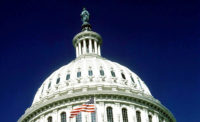The U.S. government should continue rigorous inspection of offshore oil and gas development, more than a dozen Democratic senators said.
The Department of Interior was called on to continue a study of the Bureau of Safety and Environmental Enforcement's inspection program for offshore development. A group of 19 U.S. senators, including Senate Minority Leader Chuck Schumer of New York, pointed to lessons learned from the Deepwater Horizon oil spill in 2010 as why continued rig inspections are necessary.
The administration's Jan. 4 announcement that it would open up additional areas of U.S. coasts to drilling makes it more important than ever that the federal government is using best practices to monitor the safety of these rigs," their letter to Interior Secretary Ryan Zinke read.
Proposed reg relief
In December, the Bureau of Safety and Environmental Enforcement, a division of the Interior Department, published a proposed change in the rules for offshore oil and gas drilling that would amend parts of the oil and gas safety regulations to remove the requirement for a third party to certify that certain safety devices are "designed to function in the most extreme conditions to which it will be exposed and that the device will function as designed."
BSEE later ordered the National Academies of Sciences, Engineering and Medicine to stop work on a study evaluating inspection programs for offshore drilling operations.
"BSEE's sudden cancellation of this review does not instill confidence as the administration tries to broaden offshore drilling opportunities," the Democratic Senators said.
Ahead of the December filing, BSEE Director Scott Angelle said the deregulation was a result of an executive order calling for a reduction on any undue burdens for the industry. In order to make the United States an energy superpower, as envisioned by President Donald Trump, Angelle said a "paradigm shift" was necessary for regulations regarding the outer continental shelf.
"We are also strengthening our inspection program by implementing risk-based process that focus our efforts on potential safety problems," Greg Julian, a spokesman for BSEE, told UPI. "I am confident that BSEE will be able to achieve the goal of integrating a risk-based inspection protocol in 2018."
Starting in 2010, the Interior Department, the parent agency for the BSEE, has issued rules on safety measures like the blowout preventer and well-casing pressures. Most of those rules were in force the day before Election Day 2016 and, since then, the department said it found some of those provisions were "potentially unduly burdensome" and did little to actually improve safety or protect the environment.
The BSEE under former President Barack Obama developed new standards to close what it viewed as gaps in the measures enacted in the wake of the BP oil spill in 2010. New rules covered blowout preventers, equipment used to close down a failed well. The failure of the blowout preventer was among the cascading series of events that led to the 2010 disaster that left 11 workers on the Deepwater Horizon rig dead.
Source: UPI





